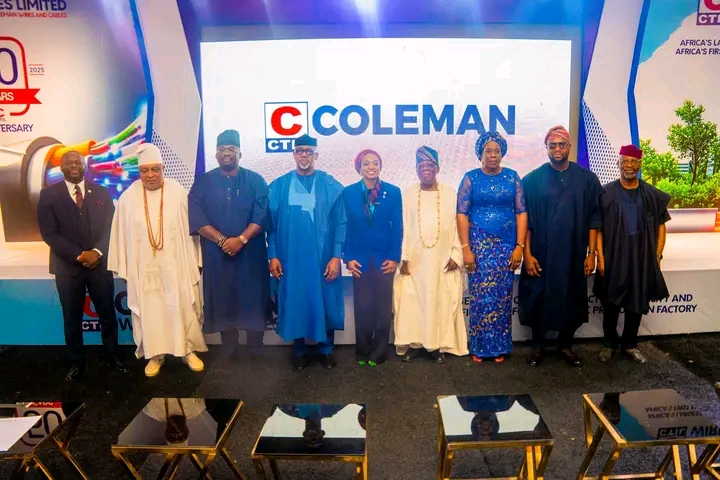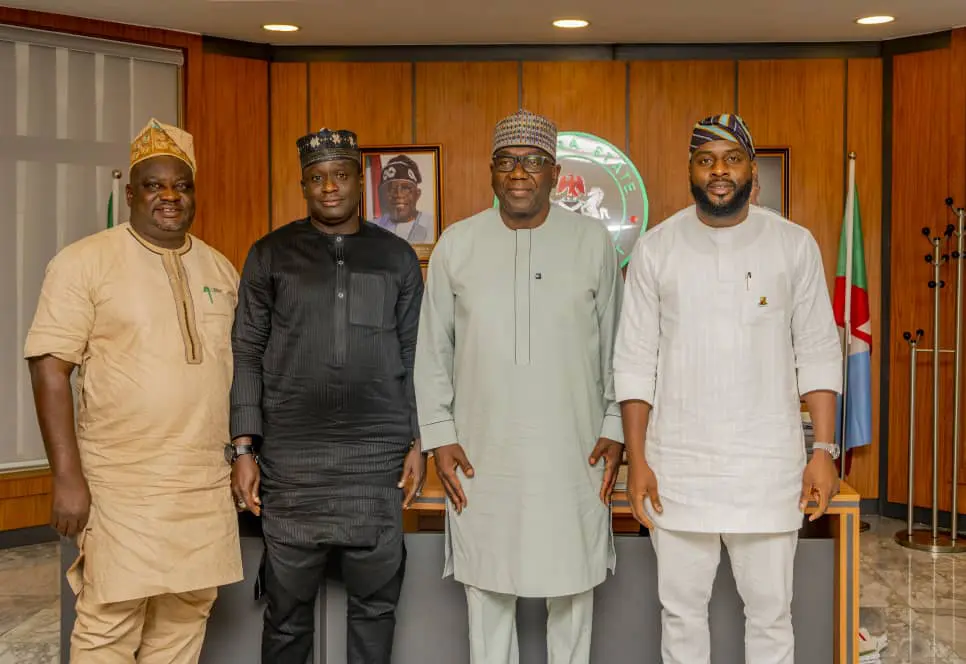President Bola Ahmed Tinubu has reiterated that Ogun State holds the title of Nigeria’s foremost industrial center, calling it the most vibrant industrial zone driving the nation’s economic development.
This statement was made on Wednesday during the launch of the second phase of Coleman Wires and Cables’ Fibre Optic Factory and the company’s 50th anniversary celebration at Coleman Technical Industries Limited in Sagamu.
Advertise With Us
Reach thousands of readers across Nigeria and beyond with The Lagos Voice — your trusted platform for news, sports, and entertainment. Boost your brand visibility today!
Get StartedPAY ATTENTION: Follow The Lagos Voice on WhatsApp channel for latest updates
Represented by the Minister of Industry, Trade and Investment, Dr. Jumoke Oduwole, President Tinubu praised the Ogun State Government for its dedication to making the state a prime investment location and for its steadfast support for manufacturers.
He recognized Coleman Technical Industries Limited for its significant role in advancing the country’s digital economy, labeling the new factory phase as a crucial national resource that will enhance Nigeria’s economic competitiveness.
“The second phase of this factory is more than just an additional line in an industrial complex—it is a crucial advancement for our digital economy. With this expansion, the firm will contribute to lowering internet costs, expanding broadband access, and reinforcing Nigeria’s technological foundation,” stated the President.
Tinubu emphasized that each kilometer of fibre created by the company “fortifies the nation’s digital infrastructure,” highlighting that the initiative would accelerate broadband access for homes and businesses, facilitate e-commerce, improve security networks, and energize smart factories and public services.
He noted that producing fibre locally would expedite and make 5G connectivity more affordable for schools, health facilities, and key national operations.
“This expansion represents progress in local content creation, technological independence, and job generation. Modern cable manufacturing yields high-quality jobs, supports backward integration, conserves foreign currency, and stabilizes our supply chains,” Tinubu added.
He also mentioned that the project is in line with Nigeria’s aspirations for clean energy, smart cities, and digital governance, reaffirming that fibre optic technology is essential for contemporary connectivity.
Ogun State Governor, Prince Dapo Abiodun, announced that his administration would soon initiate the installation of over 3,000 kilometers of fibre optic cables throughout the state to enhance digital infrastructure.
He regarded the establishment of the Coleman Fibre Optic Factory as a significant move towards closing Nigeria’s digital gap, improving national connectivity, and promoting technological advancement.
“Fibre optics are crucial for modern communication. By producing these cables domestically, we are minimizing our reliance on imports and creating thousands of direct and indirect jobs across manufacturing, logistics, construction, and ICT services,” the Governor stated.
Abiodun added that fibre infrastructure is foundational to the modern digital economy, enhancing e-commerce, enabling online education, supporting telemedicine, and connecting industries to global supply chains, ultimately fostering innovation and expanding opportunities for Nigeria’s youth and entrepreneurs.
“The increased local production of fibre optics will enhance industrial output, increase exports, and make a substantial contribution to our Gross Domestic Product,” he said.
Dr. Bosun Tijani, the Minister of Communications, Innovation and Digital Economy, revealed that the Federal Government intends to invest in a 90,000-kilometer fibre optic network nationwide to ensure connectivity across the country.
He announced that the World Bank had recently approved a $500 million funding package for this initiative—the largest project of its kind in the bank’s history in Nigeria.
“To implement this fibre network, we will need to train many young individuals. We are already in discussions with Coleman and its American partners to train around 5,000 Nigerian youths in fibre optic installation, handling, and deployment in the coming months,” Tijani stated.
Mr. George Onafowokan, Managing Director and CEO of Coleman Technical Industries Limited, indicated that the company has expanded its scope beyond cable manufacturing to become a major producer of fibre optics and industrial conductors.
He revealed that Coleman now manufactures a diverse array of products, including low, medium, and high-voltage cables; fibre optics for broadband; aluminum conductors for power transmission; and armored cables for oil, gas, and industrial uses.
With an annual production capacity of nine million fiber counts at its Sagamu facility and three million at its Arepo factory, Onafowokan mentioned that Coleman is capable of meeting the fibre optic demands for all of sub-Saharan Africa.
“We are aiming to evolve into a ₦15 trillion (approximately $10 billion) revenue enterprise in the near future,” he affirmed.







